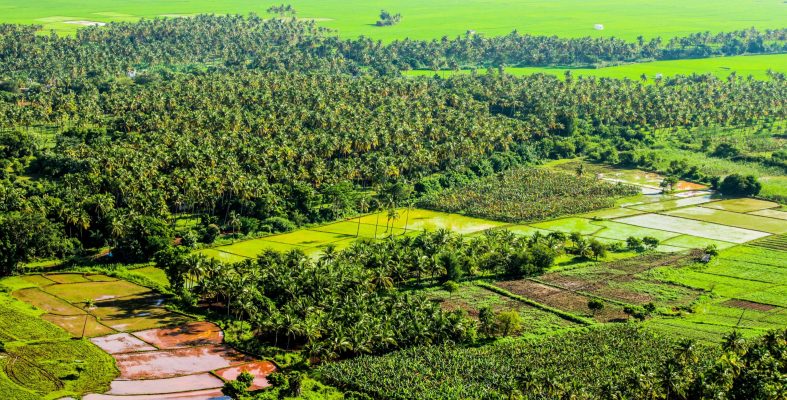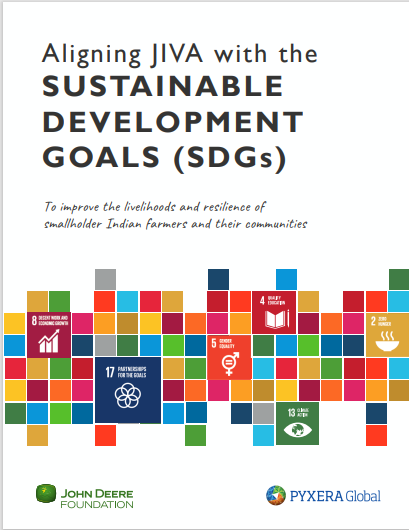Aligning JIVA with the Sustainable Development Goals

The Joint Initiative for Village Advancement (JIVA) is a holistic, demand-driven community development program co-created by the John Deere Foundation, Pyxera Global, and the communities they serve in Rajasthan, India. Growing from a pilot project area of three villages to 24 villages, JIVA’s mission is to improve the livelihoods and resilience of Indian smallholder farmers—by investing in the farmers of today and tomorrow. Its pillars—resilient agriculture, quality education, and leveraged talent from John Deere—are grounded in seven years of partnership, collaboration, learning, and adaptation.
Since the advent of the COVID-19 pandemic, institutions, markets, and daily life have been disrupted and reshaped. Globally, approximately 123 million more people will face acute food insecurity and up to 24 million students will drop out of school. The inversion of the global and local systems have underscored the value of embedding resilience within farming communities—as adapting to adversity is essential to maintaining food security, averting a “lost generation” of students, and ensuring a brighter tomorrow.
JIVA’s response to the shocks driven by the COVID-19 pandemic resulted in a distinct and inspiring set of achievements, contextualized and articulated in alignment with the United Nations Sustainable Development Goals (SDGs) in a report entitled “Aligning JIVA with the SDGs.”

While JIVA views the SDGs as interwoven, the report aims to distill the program’s strategy and impact in the context of six SDGs. SDG 2 (Zero Hunger), SDG 4 (Quality Education), and SDG 8 (Decent Work and Economic Growth) align directly with JIVA’s thematic intervention areas of resilient agriculture and accountable education. SDG 5 (Gender Equality), SDG 13 (Climate Action), and SDG 17 (Partnerships) cut across all aspects of the program. A high-level summary of the report is presented below.
Embedding Resilience—Adapting to Adversity
JIVA combines two interventions critical to farmers’ immediate and long-term success: agricultural training to sustainably increase food security, farm productivity, and farm profitability; and youth education to inspire opportunity and equity. Farmers with more education are more productive, profitable, adaptable, and resilient. JIVA also leverages and channels the energy, intellect, and resources of John Deere employees to catalyze positive change in the communities that JIVA serves.
In 2020, the COVID-19 pandemic rapidly unfolded in Rajasthan. Lockdowns and travel restrictions hampered agricultural activities, disrupted supply chains, and negatively impacted farmers’ incomes. Studies indicate that during the pandemic, 37% of farmers in India sold their harvest at reduced prices. 37% of farmers in India were unable to harvest their crops and 77% of smallholder farmers consumed less food during the national lockdown. In response, JIVA pivoted its approach using a two-track engagement strategy to support farmers with different levels of access to technology. For the one-half of farmers without access to smartphones, JIVA provided tele-consultations—supplemented by in-person visits once lockdown restrictions were eased. Farmers with access to smartphones were supported by JIVA through a sustainable online platform it created that drives peer-to-peer learning and embeds government agricultural experts to support this increasingly community-driven effort.
As a result, farmers’ enhanced capacity to apply good agricultural practices and crop diversification enabled them to absorb and mitigate the shocks induced by the pandemic and position themselves and their communities for recovery. For example, 82,122 kilograms of vegetables produced in nutrition gardens provided immediate food relief when markets were closed and have supported patients in COVID-19 quarantine centers. Similarly, although the crops primarily grown in the project area (cotton, maize, sorghum, and wheat) endured market price volatility that reduced incomes by 4%, farmers practicing crop diversification –to include commercial vegetable and fruit production – minimized the decline in income across the project area by half –to just 1.9%. In fact, when farm-based sources of income were combined with savings generated from cultivating nutrition gardens and vermicompost (a cost-effective organic fertilizer), the trend in overall household income turned positive –and increased by approximately 0.34%.
Finally, as floods and droughts ravage many parts of the world, JIVA looks to the future and does what it can to help preserve and cultivate the resilience of the community and the environment. For example, the 74,921 fruit trees planted by horticulture farmers in the JIVA project area will sequester an estimated 11,000 metric tons of carbon over the next 10 years and generate an additional $3 million in lifetime income.
Embedding Resilience—Averting a Lost Generation
While farmers are often born into farming families, there is no guarantee that children will reap the knowledge sown by a parent. Therefore—in addition to working with farmers to improve agricultural practices and ultimately profitability, savings, and reinvestment back into the farm, JIVA also strategically invests in the potential of the next generation of farmers by ensuring sustainable, quality education is available and accessible.
Prior to the COVID-19 pandemic, significant progress had been made in the quality of education in the JIVA project area. During the pre-pandemic academic year, the ratio of students scoring above 80% in subject-specific assessments increased from 22% to 35%, and the ratio of students scoring below 40% decreased from 32% to 17%. Ten villages were declared drop-out free by the government, and the returns in increased lifetime earnings from reintegrating students who had or were at risk of dropping out was $1,536,483. Furthermore, the returns in increased household savings as a result of students transferring from costly private schools to improved government schools totaled $59,247, making the estimated cumulative return on JIVA’s accountable education initiative $1,595,730.

Since March 2020, the JIVA team has pivoted its accountable education initiative to navigate the protracted schools closures and mitigate the backslide in educational achievements made to date. When the government initiated its e-learning platform – but over 80% of students did not have access to online learning – JIVA partnered with the village education coordinators and teachers to develop, distribute, and grade offline learning materials (OLMs) to help students follow their schools’ curricula at home, while also providing remote tutoring services. In the absence of regular testing practices to monitor learning outcomes, the scoring of the OLMs revealed that the ratio of students scoring above 80% in OLMs increased from 34% to 63% and the ratio of students scoring below 40% reduced from 15% to 5%.
Despite prevailing uncertainties, the ingenuity and perseverance of the JIVA communities are evidenced by the resilient and sustainable initiatives that are taking root in its accountable education activities. The increasing leadership of teachers highlights how the creation of self-driven working groups continues to drive and ensure quality education remains accessible to students in the project area. For example, the STEM Group consists of all 23 government school teachers who regularly meet – and continue to meet remotely during the lockdowns – to collaborate and learn from each other, enhance their skills, generate and apply innovative pedagogical tools and approaches to effective teaching, and increase students’ interest and performance in STEM. The success of the STEM teachers has inspired those teaching languages and teachers leading instruction on social sciences to form similar working groups. By embedding resilience in the JIVA communities’ education systems, teachers, students, parents, and School Management Committees are coming together, successfully weathering the shocks of the COVID-19 pandemic, and navigating the opportunities for the next generation on the horizon.
The Power of Partnership
The multigenerational and integrated nature of JIVA—combined with its authentic commitment to partnering with farming communities and leveraging John Deere’s extraordinary global talent to enhance its interventions—elevates the program’s vision and results into a class of their own.
Distinct from many traditional philanthropic or development initiatives, JIVA embodies equitable and inclusive collaboration among the John Deere Foundation, Pyxera Global, the communities, and other partners that strengthen the enabling environment across sectors. By consciously weaving together robust partnerships, JIVA has successfully grown from three villages to 24 villages and nine hamlets, and it is being strategically adapted and piloted-to-scale in agrarian communities in northern Nigeria.
The JIVA-John Deere Skills-Based Volunteerism Program exemplifies the value of strategic collaboration between corporate volunteers, development experts, and the communities they serve to create social impact. In 2018, a cohort of six John Deere India employees from the Lakshya employee resource group worked with JIVA’s agriculture experts to develop and pilot the Farmer Financial Literacy project with 197 farmers. In 2019, a second cohort of six John Deere volunteers co-created and implemented the Youth Agripreneurship Development Project, which trained over 150 male and female farmers aged 18 through 30. The community members who participated in the trainings have started to apply their new knowledge to improve their farms and businesses – with impressive results.
Sita Devi Kumawat, who returned to farming after nine years as a migrant worker and, with training from JIVA, restored her 1.76 hectares of degraded land into a lush and profitable enterprise. In 2020, Sita applied the financial literacy and agriprenuership skills she learned from John Deere employee volunteers to open a small shop and expand her family’s livestock. The $2718 in additional income has helped elevate her family’s annual farm-based income – from $850 in 2013 to $6927 in 2020. With additional training in simple agriculture extension techniques, Sita and other leading farmers in the community are becoming Resource Farmers – and will continue to be beacons of information and knowledge for farmers throughout the community about effective farming practices.
“The John Deere volunteers did a great job explaining complex concepts in a very simple way so that the content is clear to the participants. The facilitators also asked questions directly to the participants to ensure that every participant was learning. I have also started to practice these techniques when I am helping farmers understand certain farming concepts. I like the information about savings, especially when they emphasized the importance of women having their own bank accounts.”


